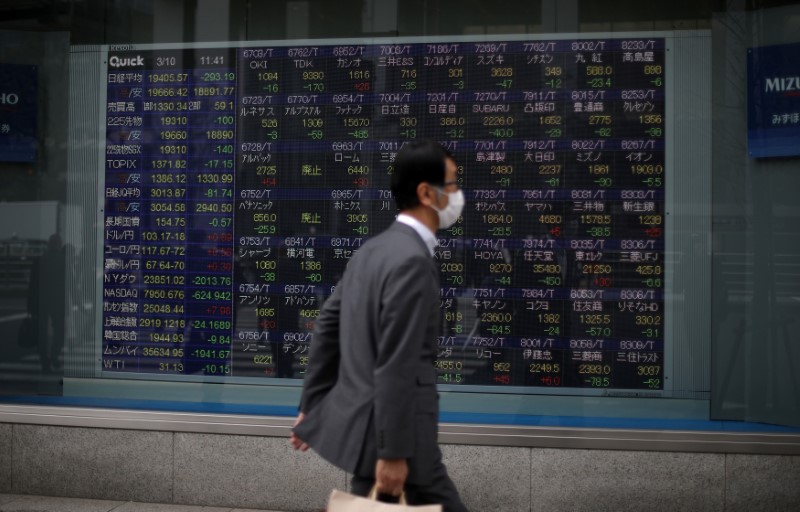By Ritvik Carvalho
LONDON (Reuters) - Stock markets rebounded from some of their recent huge losses on Friday, pulling further away from three-year lows as central banks and governments pledged masses of cash to reduce the economic impact of the coronavirus pandemic.
Shares soared at the start of trading in Europe, with the pan-European STOXX 600 index jumping nearly 5%. The index was up 3% as of midday in London.
Britain's FTSE rose 2%, Germany's DAX gained nearly 5%, and France's CAC 40 gained 5.5%. Spanish stocks were up 3.3% and Italian stocks gained 2.7%.
MSCI's All-Country World Index, which tracks stocks across 49 countries, was up 1.3%.
But in an indication of the deep damage inflicted on global equities from the pandemic so far, the index remains set to finish nearly 9% lower this week, adding to last week's 11.1% plunge.
U.S. S&P 500 e-mini stock futures pointed to a brighter end to the week, adding 2.6%.
As the spread of the coronavirus brought much of the world to a halt, nations have poured ever-more massive amounts of stimulus into their economies while central banks have flooded markets with cheap dollars to ease funding strains.
The U.S. Senate was debating a $1 trillion-plus package that would include direct financial help for Americans, relief for small businesses and steps to stabilize the economy.
Sources told Reuters that China was set to unleash trillions of yuan of fiscal stimulus to revive an economy facing its first contraction in four decades, though on Friday the country surprised markets by keeping its lending benchmark unchanged.
"Markets, in our view, will ultimately settle down if three conditions are met: 1) visibility on the ultimate scale of the coronavirus outbreak and evidence the infection rate as peaked over the long term; 2) deployment of credible and coordinated policy packages; and 3) confidence that financial markets are functioning properly," asset manager BlackRock (NYSE:BLK) said in a note.
It said it was neutral on risk assets and advised investors to take a long-term perspective as "significant value is being created on riskier assets."
In currency trading, the dollar lost some steam after hitting more-than three-year highs this week as investors dumped many assets in favor of the world's reserve currency.
The index that tracks the greenback against a basket of peer currencies was down 1.3%.
The recent surge in the dollar is a nightmare for the many countries and companies that have borrowed heavily in the U.S. currency, leading to yet more selling of emerging market currencies in a negative feedback loop.
"The speed and aggression with which authorities are wheeling out measures to cushion the economic fallout from the virus and sowing the seeds for a hopefully rapid recovery, has resonated somewhat in equity markets," said Ray Attrill, head of FX strategy at NAB.
"Yet there is little doubt that funds need to buy dollars to rebalance hedges in light of the 30% fall in equity markets so far this month," he added. "The dollar remains the pre-eminent safe-haven asset during times of extreme market stress."
Investors in Asia were nevertheless just happy that Wall Street had not plunged again. South Korean shares bounced 7.4%, though that still left them down more than 11% for the week.
Australia's beleaguered market eked out a 0.70% gain, and futures for Japan's Nikkei were trading up at 17,710, compared with the cash close of 16,552.
OIL RELIEF
Aiding sentiment was a rally in oil prices overnight. U.S. crude was 3% higher at $26 a barrel on Friday, up from a low of around $20, while Brent crude was higher by 2.6% at $29
This was a major relief as the collapse of crude prices had blown a huge hole in the budgets of many oil producers and forced them to dump any liquid asset to raise cash, with U.S. Treasuries a particular casualty.
After climbing more than 100 basis points in nine sessions, U.S. 10-year Treasuries steadied around 1.0241%.
At the same time, funds across the world were fleeing to the liquidity of U.S. dollars, lifting it to peaks not seen since January 2017 against a basket of its peers.
"Such price action suggests significant market stress, particularly on the wide range of entities outside the U.S. that have borrowed in dollars," said Richard Franulovich, head of FX strategy at Westpac.
"It could last until global capital flows and investor risk appetite normalizes, possibly months away."
The euro rose 0.4% to $1.0733 but was not far off three-year lows, having shed more than 3% for the week so far - the steepest decline since mid-2015.
Sterling continued its wild swings with a blistering 3% rally to $1.1878, having earlier hit its lowest since 1985 around $1.1404. It was still down 3% for the week.

The jump in the dollar has made gold more expensive in other currencies. While it rallied on Friday to $1,505.78 per ounce, it remains down about 1.6% on the week.
